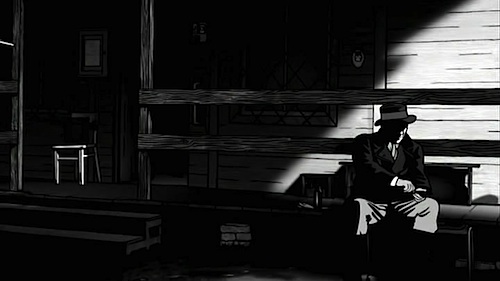By Joe Bendel. He will be one of the last “patients” to witness the business end of a Communist era mental hospital. Ironically, the provincial train dispatcher could benefit from professional psychiatric treatment, but he will have to exorcise the ghosts from his past on his own in Tomáš Luňák’s Alois Nebel, which releases today on Blu-ray/DVD from Zeitgeist Films.
Based on the first Czech graphic novel published after the Velvet Revolution, AN begins during the waning days of Communism. A fugitive Mute has been captured at Alois Nebel’s sleepy station in Bílý Potok, much to the satisfaction of his scheming co-worker, Wachek. A black marketer and snitch, Wachek and his old sinister man are unnerved by news of the fall of the Berlin Wall. However, they still have extensive contacts with the local officials and the nearby Soviet garrison, which they intend to exploit while they still can.
Coveting Nebel’s position, it is rather easy for Wachek to have him institutionalized, especially since the dispatcher is legitimately disturbed. As a child, Nebel witnessed the forced post-war deportations of ethnic Germans from the Czechoslovakian Sudetenland, including very personal atrocities that continue to trouble his mind as dreams and hallucinations. Frankly, his deliriums are becoming more frequent and intense, but he will get little treatment in the sanitarium beyond some mind-numbing drugs. Yet he will find himself compulsively drawn to the mysterious Mute also incarcerated there.
Eventually, Communism will fall and Nebel will be released, but without the security of his former position. The lifelong railroad employee will spend months in the veritable wilderness, living amongst the homeless in Prague’s grand Central Station. Of course, all roads lead back to Bílý Potok for a reckoning of Biblical dimensions.

Rendered in the rotoscoping style notably employed by Richard Linklater’s A Scanner Darkly, the live action conversion technique is not universally embraced by animation fans. However, Luňák and head animator Pavla Dudová’s striking black-and-white application perfectly suits AN’s moral ambiguities and noir sensibilities. Every frame of this film looks absolutely beautiful, in a moody, atmospheric sort of way.
Indeed, this is a dark film in every conceivable manner. The railroad motif is no accident, representing a wide array of Twentieth Century horrors, including the Holocaust, troop transportation to the front, and the post-war vengeance taking. The rather militarist look of Nebel’s railroad uniform is also hard to miss, especially in light of his German surname (meaning “fog” or “life” spelled backwards).
Given the rotoscope method, real performances went into the making AN beyond mere voice-overs. Although modeled after the graphic novel character, Miroslav Krobot invests the animated Nebel with profoundly heavy world-weariness and guilt. Likewise, Karel Roden helps create a haunted and haunting portrait of the Mute.
Although Alois Nebel presents a decidedly pessimistic vision of human nature, it is not cynical. In fact, one could argue it is ultimately quite humanistic. Nonetheless, it is definitely an animated feature for connoisseurs who prefer their film noirs served straight, no chaser. Visually arresting with an unusually sophisticated narrative, Alois Nebel is highly recommended for fans of ambitious adult animation and Czech cinema. It is now available for home viewing as part of the Kimstim collection from Zeitgeist Films, along with Eric Khoo’s richly rewarding Tatsumi.
LFM GRADE: A-
Posted on March 26th, 2013 at 11:19am.